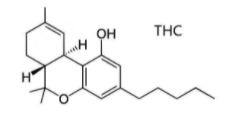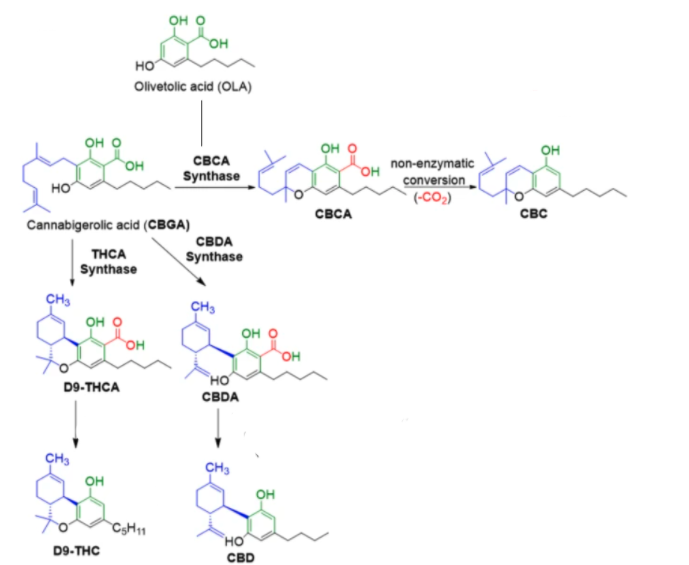When we talk about CBD, we're referring to cannabidiol, a very specific molecule found in all varieties of Cannabis Sativa L. Perfectly legal in France, the EU and most other countries, CBD has no psychotropic effects and, according to the WHO, is harmless to health. What's more, the scientific community attributes numerous well-being and therapeutic properties to CBD.
CONTENTS
Where does CBD come from?
The chemical structure of CBD was identified in 1963 by Israeli doctor Raphaël Mechoulam, at the same time as that of tetrahydrocannabinol, better known as THC. While these two molecules share the same chemical formula (C21H30O2), they do not have the same molecular architecture.


THC is a psychoactive substance responsible for the "high" of cannabis, while CBD has no effect on the perception of reality.
Cannabis Sativa L.: a source of cannabidiol.
Prey to many amalgams, cannabis suffers from an extremely binary reputation, sometimes considered a harmful drug, sometimes claimed to symbolize a social revolution. With the marketing of products made from cannabis extracts, the plant is more than ever in the spotlight. This is an opportunity to untangle some persistent confusion.
We call it cannabis, medical cannabis, marijuana or hemp, and sometimes Indian hemp or industrial hemp. In reality, all these terms refer to a single species of the Cannabaceae family, whose botanical name is Cannabis Sativa L.
There are, of course, many different varieties of Cannabis Sativa L. They can be classified according to their appearance, but also according to their chemical identity and thus the effect induced when consumed.
Not everyone knows it, but there are cannabis strains that contain very little THC. These varieties are listed in the European catalog and are perfectly legal. In fact, they are freely cultivated: in France, there are over 3,000 hemp growers covering almost 20,000 hectares.
CBD is therefore extracted from cannabis varieties low in THC. The cannabis plants we use to produce our oils are grown in Switzerland and France, outdoors during the season and in greenhouses the rest of the year.
Biosynthesis of CBD and phytocannabinoids
Cannabinoids are substances that interact with the endocannabinoid system (ECS). We'll be talking more about the ECS in the future, but for now it's just a question of knowing that it exists:
- Endocannabinoids: these substances are naturally produced by the ECS in the bodies of all animals, including humans. Two endocannabinoids are currently known: AG-2 and anandamide.
- Phytocannabinoids : these phytochemicals are synthesized in the cannabis plant. Some are synthesized in the first few weeks of growth. Others are produced during flowering, such as cannabigerol (CBG), cannabinol (CBN) and tetrahydrocannabinol (THC).
CBD is synthesized alongside THC at the end of flowering, in the trichomes of the flowers.

CBGa, the acid form of CBG, is transformed into CBDa and THCa. Under the effect of decarboxylation, we then obtain our famous THC and CBD duo. This explains why they share the same chemical formula: they have the same precursor, CBG.
Being synthesized very early on, the other phytocannabinoids (CBC, CBN, CBG) tend to degrade under the effect of heat and light. As a result, when the cannabis plant reaches maturity - after around 5 weeks - only 1% of each of these cannabinoids remains. The proportion of CBD and THC varies according to variety.
Cannabidiol (CBD) extraction methods
There are, of course, synthetic cannabinoids, and some products are based on CBD obtained artificially in the laboratory. At Nobilis, we're committed to Mother Nature. That's why all our oils are made from phytocannabinoids extracted from cannabis.
We have chosen to develop our oils with respect for the environment. Our plants feed only on love, fresh water and organic fertilizers. When it comes to extracting their precious substance, we have again chosen a clean method, with no added chemicals.
To extract CBD - and more broadly, the plant's cannabinoids and terpenes - we use a technique that replaces traditional solvents with supercritical CO2. This process requires a certain amount of expertise, and the equipment required is expensive. Nevertheless, it is the safest extraction method for consumer health.
Rather than ethanol, propane or butane, we use the special properties of CO2 in its supercritical, fluid state. Under these conditions, carbon dioxide behaves like a halfway house between a gas and a liquid, making it an excellent natural solvent.
Supercritical CO2 is in fact capable of separating the fine particles contained in cannabis flowers and resins. Not only the precious CBD, but also all the other cannabinoids and terpenes can be recovered .
What are the effects of CBD?
As CBD is a lipophilic molecule, it is metabolized by the liver. Its elimination from the body is rather slow, with a half-life of between 56 and 61 hours when taken orally. As far as side effects are concerned, studies have shown that CBD has only superficial side effects: drowsiness, digestive disorders and changes in appetite.
These studies have also highlighted several of CBD's mechanisms of action once in the body. Although there are still many grey areas, we now know which are the main neurotransmitters targeted by cannabidiol:
- CB1 and CB2 of our endocannabinoid system;
- TRPV1 in our peripheral nervous system;
- GABAA in our central nervous system.
CBD's affinity with these different receptors opens the door to an infinite number of possible benefits, both for healthy people and for those suffering from any disease.
Wellness and health
In the 90s, while trying to understand the behavior of THC in our bodies, a team of researchers identified the endocannabinoid system. These observations showed that phytocannabinoids react with a whole network of receptors scattered throughout the body, particularly in the vital organs.
Although little known to the general public, this vast network of neurotransmitters plays a crucial role in our health. It ensures homeostasis, a regulatory phenomenon that maintains a system's equilibrium .
CBD acts on internal temperature, blood pressure, hormone synthesis and more. As a result, CBD restores the balance of certain physiological functions, leading to animprovement in general well-being.
For example, CBD is said to help :
- Getting back to restful sleep;
- Lower stress and anxiety levels;
- Better pain management;
- Managing emotions ;
- Modulate appetite;
- Increase energy and concentration.
CBD's action is generally described as subtle, but concrete. In other words, CBD-based products are not aggressive like the sleeping pill that knocks out or the anxiolytic that inhibits. However, according to our customers' testimonials, a few drops of our CBD oil induce an almost immediate feeling of serenity.
Legal framework for CBD (Cannabidiol)
CBD is perfectly legal in France, the EU and most other countries around the world. Nevertheless, its commercialization has been the subject of several tumultuous media episodes. To put things in context:
📖 Although the CBD molecule is extracted from cannabis, it has never been considered an illegal substance. In fact, in France, products made from hemp extracts must not contain more than 0.3% THC.
📖 The marketing of CBD and its circulation within the EU have always been authorized. As a member country, France has never had the right to ban the import and sale of CBD on its territory.
📖 Currently, for legal reasons, CBD extracted in France comes only from the plant's stems and leaves. For this reason, most CBD products are produced in laboratories located in nearby Europe, where growers can extract CBD from the flower.
As far as we're concerned, our range of Nobilis CBD oils is produced in France and meets the requirements of our legislation. We provide a component analysis carried out by an independent laboratory at the request of our customers. This makes it possible to verify the concentration of cannabinoids (CBD, THC and others), as well as the absence of any harmful chemical substances.
How to use CBD?
There are no specific contraindications, and anyone can, a priori, consume CBD. Bear in mind, however, that most of the advice you'll find on the Internet is not written by doctors. If you are undergoing treatment, or if you have the slightest doubt, consult a health professional.
The different CBD products
CBD is a relatively simple molecule to extract, and can be added to virtually any base, provided it contains fat. Remember that phytocannabinoids are hydrophobic.
As a result, there's a whole range of CBD products, from vaping e-liquids to snack foods and cosmetics. But of all of them, CBD oil is undoubtedly the most popular. It's the easiest way to consume CBD:
- CBD oil keeps very well and is easy to transport;
- It is extremely versatile, as you can apply it directly to the skin or place a few drops under the tongue;
- You can also mix your CBD oil with any medium, incorporating it into your favorite recipe, your day cream or even your e-liquid;
- Full spectrum CBD oils- i.e. those containing the entire molecular make-up of cannabis - allow you to enjoy both the distinctive taste of cannabis and the entourage effect. The entourage effect is a theory according to which CBD is all the more effective when in the presence of the plant's other cannabinoids and terpenes.
Finally, it's a great way to get started with CBD, as there are low-concentration oils that facilitate gentle dosing. This is the case, for example, with our 10% CBD oil, ideal for those who have never taken CBD before. Of course, other products are also available (flowers, infusions, e-liquids, etc.).
Dosage and spacing of plugs
You won't find an official dosage for CBD. Firstly, because the molecule is not recognized as a medicine. Secondly - and above all - because each individual reacts differently to cannabinoids. Indeed, beyond the fact that height, weight, age and physical condition must be taken into account, some people are more sensitive than others to the action of CBD.
Although studies have shown that 1500 mg CBD/day is not harmful to humans, we recommend starting with a low amount of CBD. That is, between 20 and 30 mg/day. Observe the effects for a few days, then gradually increase if necessary.
As for the spacing between doses, there's no standard here either. Some people take their CBD in a single dose, in the morning or evening. Others prefer to take it 3 or 5 times a day. You don't have to take your CBD every day. Many people simply take it when they feel the need - when they're feeling stressed, for example.
If you've never used CBD before, you should avoid taking it for the first time just before a car journey. Not that you'll risk anything in the event of a police check-up, butCBD's relaxing effect may eventually reduce your alertness behind the wheel.
Calculating the number of drops of CBD oil
Most CBD oils, including ours, are packaged in small bottles fitted with pipettes. This makes dosing much easier, but you still need to keep a few orders of magnitude in mind to avoid making mistakes.
Let's take the example of a 10% CBD oil sold in a 10 ml bottle.

This bottle therefore contains: 1000 mg of CBD. Given that a drop measures 0.05 ml, our bottle contains 200 drops. This means that one drop of CBD oil contains 5 mg of CBD. A novice consumer can therefore start with 5-6 drops a day.
Buying CBD: which brand?
CBD is available over the counter, and you'll have no trouble getting your hands on it. Whether on the Internet or in a specialist store, there's plenty to choose from! The only hitch is that it's not always easy to tell the difference between one serious brand and another. This is made all the more difficult by the fact that there are very few regulatory quality controls. Indeed, the only standard imposed on CBD sellers and retailers is the THC content, which must be less than 0.2%.
At Nobilis, we believe in encouraging newcomers, but we know that developing a quality product requires both expertise and financial resources. Our CBD oil is the result of years of hard work and effort. And we recommend giving preference to experienced producers whose adventure began long before the fad of recent years.
As growers, we also know how rare CBD and quality cannabis extract are. In order to maximize productivity, some growers opt for intensive cultivation and use extraction methods that are not necessarily very healthy.
As far as we're concerned, we're hemp farmers who respect the environment, and the farms we work with have been scrupulously selected. We invite you to choose brands that follow this same approach.
The final word on CBD...
We hope you'll find this a little clearer! If you still have any doubts, please don 't hesitate to contact us, as we'll be delighted to answer any questions you may have. We love what we do, and we love talking about it, so we'd love to hear from you.
In any case, we leave at your disposal the list of scientific studies and official reports cited in this article. Most of them are in English, but you'll find all the bases for our assertions there.
Our sources
- The definition of Cannabis Sativa L.: https://fr.wikipedia.org/wiki/Cannabis_sativa
- CBD synthesis : https://jcannabisresearch.biomedcentral.com/articles/10.1186/s42238-021-00062-4
- CBD metabolism: https://fr.wikipedia.org/wiki/Cannabidiol
- CBD and the endocannabinoid system : https://www.ncbi.nlm.nih.gov/pmc/articles/PMC3820295/
- CBD for pain relief and as an anti-inflammatory : https://www.ncbi.nlm.nih.gov/pmc/articles/PMC7023045/
- CBD as a painkiller: https://www.ncbi.nlm.nih.gov/pmc/articles/PMC7204604/
- Cannabidiol to treat epilepsy: https://ligueepilepsie.be/Que-penser-du-cannabidiol-CBD-dans-le-traitement-de-l-epilepsie.html
- CBD and neurodegenerative diseases: https://www.ncbi.nlm.nih.gov/pmc/articles/PMC7515854/
- According to the WHO, CBD is not harmful to humans and could even offer numerous possibilities in the medical field: https://www.who.int/medicines/access/controlled-substances/5.2_CBD.pdf
